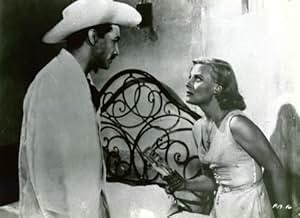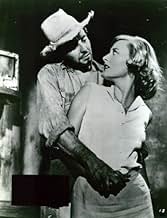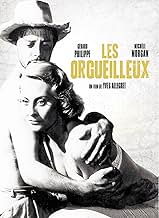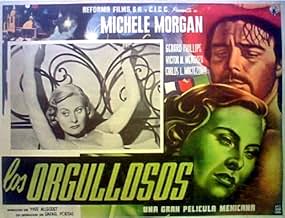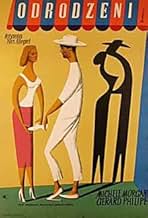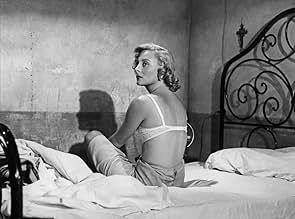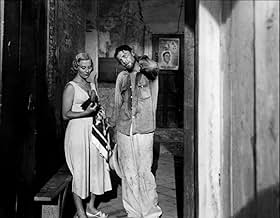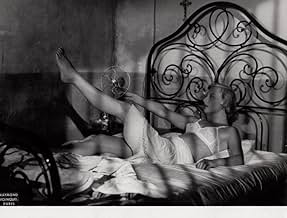VALUTAZIONE IMDb
7,2/10
940
LA TUA VALUTAZIONE
Aggiungi una trama nella tua linguaLife in a small Mexican village where joy and misery, hope and pain, passion and guilt, love and decay, life and death are mixed in the peasants life and two French citizens who end up stran... Leggi tuttoLife in a small Mexican village where joy and misery, hope and pain, passion and guilt, love and decay, life and death are mixed in the peasants life and two French citizens who end up stranded in there, during a typhoid epidemic.Life in a small Mexican village where joy and misery, hope and pain, passion and guilt, love and decay, life and death are mixed in the peasants life and two French citizens who end up stranded in there, during a typhoid epidemic.
- Regia
- Sceneggiatura
- Star
- Candidato a 1 Oscar
- 1 vittoria e 3 candidature totali
Luis Buñuel
- Smuggler
- (non citato nei titoli originali)
Recensioni in evidenza
`Les Orgueilleux' is one of a constellation of worthy French movies of this era that the French stopped making for two reasons: the complete lobotomy of the intellect that was the so-called New Wave and the premature death of Gérard Philipe, one of the century's finest actors. His pairing with Michèle Morgan here is inspired. (They also starred in René Clair's `Les Grandes Manoeuvres'.) In order to describe Philipe's charm, one has to evoke equal parts Leonardo DiCaprio and Laurence Olivier and imagine them cast as romantic leads in the kind of challenging narrative that is not even conceivable today, except for the odd exception. `Les Orgueilleux' is set during a typhus epidemic in a remote Mexican village and is based on Jean-Paul Sartre's novel `L'Amour rédempteur' (`Redeemed by Love', aka `Typhus'). The oversimplification of the novel's themes is compensated by Allégret's penchant for realism and his attention to details, like the long scene of Morgan enduring the discomfort and perils of a lonely hotel room during a heat wave in a third rate Mexican hotel, which is part striptease (daring for the time) and part psychological analysis. In other words, a perfect blend of commercialism and intelligence, both qualities sadly lacking from the aforementioned so-called New Wave.
Allegret's most impressive location story, far better than the damp philosophizing of Une si jolie petite plage. I liked the approach: the characters are not symbols of alienation or corruption but have lives of their own. The meningitis outbreak in this Mexican town doesn't stand in for the moral decline of the West, unlike the plague in Puenzo's La peste, one of the worst films William Hurt ever made. I imagine that if Luis Bunuel had done this adaptation of a Sartre story, it would have looked a lot like Los olvidados, and the vomiting and sweating of the victims would have taken precedence over the moral self-questioning of the characters.
Gerard Philipe is tremendous as the drunken ex-doctor with a terrible secret; he was able to forget that he'd become the official leading man of French cinema, star of the Cinema of Quality that Truffaut detested so much. Ditto for Michele Morgan, whose parts usually had aristocratic backgrounds, or at least great wealth. As the not-very-grieving widow of the first disease victim, she holds the picture together, making sure we don't get too swayed by Philipe's lowlife antics.
Gerard Philipe is tremendous as the drunken ex-doctor with a terrible secret; he was able to forget that he'd become the official leading man of French cinema, star of the Cinema of Quality that Truffaut detested so much. Ditto for Michele Morgan, whose parts usually had aristocratic backgrounds, or at least great wealth. As the not-very-grieving widow of the first disease victim, she holds the picture together, making sure we don't get too swayed by Philipe's lowlife antics.
Allegret reached his peak in 1947-1949 with "Dédée d' Anvers" "une si jolie petite plage" and "manèges".Afterwards,his works became either disastrous ("la jeune folle" ) or academic (Zola's "Germinal")."Les orgueilleux" is a notable exception.Gerard Philippe's over the top portrayal of an always drunk deposed doctor is impressive.Michèle Morgan has never been so sensual.But what matters is the sultry moist atmosphere.Michèle Morgan is sweating throughout the whole movie.Very few things happen after Morgan's husband's death,but the depiction of a Mexican one-horse town during the Holy week is awesome.One could draw a parallel(almost bunuelian) between the Passion and Morgan's sentimental life:death on Good Friday of what she thought was the love of her life;resurrection on Easter day on the beach when she realizes she's found true love.
Yves Allégret was extraordinary when it came to making you FEEL what his characters endure:so strong the pictures are that we're hot,we sweat as much as them.He did the same in "une jolie petite plage" where the rain never stopped falling.Maybe he learned his lesson from Victor Sjostrom(Seastrom) who could make us feel" the wind" ,and in a silent movie at that.
Yves Allégret was extraordinary when it came to making you FEEL what his characters endure:so strong the pictures are that we're hot,we sweat as much as them.He did the same in "une jolie petite plage" where the rain never stopped falling.Maybe he learned his lesson from Victor Sjostrom(Seastrom) who could make us feel" the wind" ,and in a silent movie at that.
I sat through this movie this evening, forcing myself to stick with it even though I never cared about any of the characters or what happened to them, because the two leads, Gérard Philippe and Michèle Morgan, were major film stars of their era and I wanted to see them in "something different," which this certainly was. They both gave fine performances, but of distasteful characters.
Indeed, the whole movie is about a shabby little town in Mexico inhabited by almost uniformly distasteful characters (the doctor is, of course, the major exception). What Michèle Morgan ever sees in Philippe to fall in love with him is never explained.
This is supposedly based on a work by Jean-Paul Sartre. All I could think was that, if Sartre's work is anything like this movie, it must be a very mediocre attempt at imitating Camus' masterful novel The Plague, which dealt with a plague in North Africa.
A well-acted but uninteresting movie.
Indeed, the whole movie is about a shabby little town in Mexico inhabited by almost uniformly distasteful characters (the doctor is, of course, the major exception). What Michèle Morgan ever sees in Philippe to fall in love with him is never explained.
This is supposedly based on a work by Jean-Paul Sartre. All I could think was that, if Sartre's work is anything like this movie, it must be a very mediocre attempt at imitating Camus' masterful novel The Plague, which dealt with a plague in North Africa.
A well-acted but uninteresting movie.
One of the greatest films I've ever seen, this movie took me completely by surprise, considering I'd never heard of it, and the videotape cover was very cheesy. Set in a small Mexican town, the main character is a drunk who is so intoxicated throughout the movie he can hardly walk. A plague of cerebral-spinal meningitis hits the town. This film has a startlingly raw edge to it, like nothing else I've seen from the 50s, but more like a Midnight Cowboy kind of down-and-out unflinching view of human situations. One of the first images is of the drunk carrying a pig's head through the streets of town. He delivers it to a whorehouse. The prostitute offers to pay him with sex, but he chooses to be paid in tequila. There's another scene of him cleaning up vomit, and a scene where the local doctor, the drunk, and a woman tourist take turns inoculating each other in the spine with a huge needle. This is not to say that the film is shocking or gross, but simply human and realistic. The photography is utterly pure and perfect. Nearly every composition is dynamic, with a strong perspective, background and foreground in play, half the shots have some kind of movement, dolly or pan, which is used concisely and never intrusively. Every set up is intelligent, resourceful and well executed. The acting is simply brilliant, the stars are believable, realistic and likeable. I don't know the story behind this production, or why it has slipped into obscurity, but it struck me as one of the GREAT films, comparable to something by Robert Bresson(who is one of my favorite directors) so, as you can guess, I highly recommend this. It's a ten.
Lo sapevi?
- QuizJean-Paul Sartre wrote ten drafts for screenplays to be used by Columbia Pictures, of which only three were typed down. The other seven were sort of rejected, and one of these, 'Typhus' came to be the obvious inspiration for Les orgueilleux/Los Orgullosos, Yves Allégret's co-production with Mexico. The film won the Bronze Lion in the 1953 Venice Film Festival, ex-aequo with La guerra di Dio (1953), Mano pericolosa (1953), and Sinha Moca, la dea bianca (1953), and also a Special Prize from the same Jury. When the film was nominated for Best Writing, Motion Picure Story, for the 1957 Academy Awards - in the wake of the film's release in the USA, with promotional materials emphasizing it was "Jean-Paul Sartre's The Proud and the Beautiful", the French philosopher disowned his authorship. The film has also been said to be based on Sartre's novel, "L'amour redempteur"... which he never wrote! This myth did not end, even after its exposure as such in "Feature Cinema in the 20th Century: Volume One: 1913-1950: a Comprehensive Guide", by By Jacek Klinowski et al.
- ConnessioniFeatured in Censura: Alguns Cortes (1999)
I più visti
Accedi per valutare e creare un elenco di titoli salvati per ottenere consigli personalizzati
- How long is The Proud and the Beautiful?Powered by Alexa
Dettagli
- Data di uscita
- Paesi di origine
- Lingue
- Celebre anche come
- The Proud and the Beautiful
- Luoghi delle riprese
- Aziende produttrici
- Vedi altri crediti dell’azienda su IMDbPro
- Tempo di esecuzione1 ora 43 minuti
- Colore
- Mix di suoni
- Proporzioni
- 1.37 : 1
Contribuisci a questa pagina
Suggerisci una modifica o aggiungi i contenuti mancanti

Divario superiore
By what name was Gli orgogliosi (1953) officially released in Canada in English?
Rispondi
